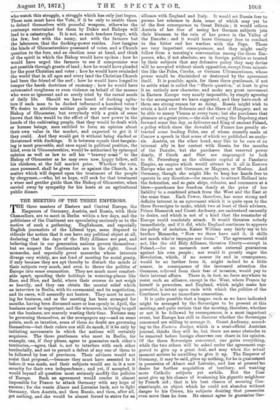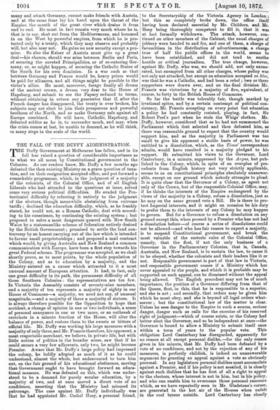THE MEETING OF THE THREE EMPERORS.
THE three masters of Eastern and Central Europe, the Emperors of Germany, Austria, and Russia, with their Chancellors, are to meet in Berlin within a few days, and the politicians of the Continent are speculating anxiously as to the motive of such a gathering. Englishmen, and especially English journalists of the Liberal type, seem disposed to ridicule the notion that it can have any political object at all, declaring that the days of the Holy Affiance are past, and believing that in our generation nations govern themselves ; but we suspect the Continentals are in the right. Great monarchs, and especially great monarchs whose interests diverge very widely, are not fond of meeting for social gossip, if only because they are apt there'by to disturb the minds of their subjects very much, and even to throw the politics of Europe into some commotion. They are much more comfort- able apart, spending their holidays in watering-places like Ems, and Nice, and -Lehi, where their crowns do not weigh so heavily, and they can obtain the mental relief which an interview in Berlin, with its ceremonial, and its negotiation, and its cares, will assuredly not bestow. They must be meet- ing for business, and as the meeting has been arranged for months, having been discussed more or less openly in April, the business must be important, and the wiseacres, in trying to spell out the business, are scarcely wasting their time. Nations may be governing themselves, as the newspapers say—and on some points, such as taxation, some of them no doubt are governing themselves—but their rulers can still do much, if it be only by initiating movements in which the nations will certainly acquiesce. The three gentlemen who meet in Berlin, for example, can, if they please, agree to guarantee each other's territories,—agree, that is, not to interfere with each other territorially, and not to permit a defeat of any one of them to be followed by loss of provinces. Their advisers would not' resist that proposal,—because they must have assented to it before it was made, and their subjects would see in it a new security for their own independence ; and yet, if accepted, it would beyond all question most seriously modify the policies of 'Europe. Such an agreement would render it almost impossible for France to attack Germany with any hope of success ; for she wants Alsace and Lorraine back, not to fight Germany, then Austria, and then Russia, and then, after all, get nothing, and she would be almost forced to strive for an alliance with England and Italy. It would set Russia free to pursue her schemes in Asia, some of which may yet be of • the first consequence to Great Britain ; it would relieve Austria of her fear of seeing her German subjects join their kinsmen to the ruin of her power in the Valley of the Danube ; and it would leave Germany free to conduct to the bitter end her warfare with the Pope. Those are very important consequences, and they might easily follow from a morning's conversation among the three Em- perors, who, if not absolute, are in foreign politics so trusted by their subjects that any defensive policy they may devise will be accepted without much opposition, except from minori- ties like the Poles, Czechs, or German Ultramontanes, whose power would be diminished or destroyed by the agreement itself. It is possible, again, for these three gentlemen, if not to settle what is called the " Slavic question," at least to give it an entirely new character, and make any great movement in Eastern Europe very nearly impossible, by simply agreeing to the arrangement we have suggested, and they have each of them one strong reason for so doing. Russia might wish to retain a hold over Bohemia and the Slays of Hungary, and so be able to annoy Vienna at every turn; but she purchases that pleasure at a great price,—the risk of seeing the Hapsburg start forward some fine day, as deliverer and King of ancient Poland, a policy which since the downfall of France has greatly at- tracted some leading Poles, one of whom recently made at Cracow a speech in that sense of which we published an analy- sis. Austria, on the other hand, may like to be sure of an internal ally in her contest with Russia for the mouths of the Danube, but she purchases that reserved power dearly, if Czech and Slav are encouraged to look to St. Petersburg as the ultimate capital of a Panslavic Empire, an empire which would attract to it all in Eastern Europe who are not Germans, or Magyars, or Moslem. And Germany, though she might like to keep her hands free to operate in any direction—for example, to attract Holland into the federation, and so gain ships, colonies, and commerce at blow—purchases her freedom dearly at the price of her liability to a combined attack from the West and the East at the same time. Each Power, therefore, has some strong and definite interest in an agreement which it is quite open to the three Sovereigns to make, which two at least of their advisers, Prince Bismarck and Count Andrassy, are understood earnestly to desire, and which is not of a kind that the remainder of Europe could resolutely attack. It would threaten nobody immediately, and if it did, while England continues to approve the policy of isolation, Kaiser William may fairly say to his brother Monarchs, " Now we three have said it, it skills not much who'er impugns our doom." The agreement would not, like the old Holy Alliance, threaten liberty—except in Poland,—for no monarch now asks external guarantees against his own people ; nor would it greatly anger the Revolution, which, if no nearer its end in consequence, would be no further from it, might indeed be a little nearer, in consequence of the increased attention the Germans, relieved from their fear of invasion, would pay to their internal affairs. There is, in fact, no force anywhere to resist such an alliance, except in the West, where France by herself is powerless, and England, which might make her powerful, is intent upon ends with which the politics of the Continent have no immediate connection.
It is quite possible that a league such as we have indicated might be arranged by the Sovereigns to be present at this meeting, and quite certain that the meeting, therefore, whether or not it be followed by consequences, is a most important 5 event, but Europe has still to discover whether the Sovereigns concerned are willing to arrange it. Count Andrassy, accord- ing to the Eastern Budget, which is a semi-official Austrian journal, thinks they will be, but there are some obstacles to
be removed before foreign observers can share in his opinion.
Of the three Sovereigns concerned, one gains everything, while the two others will be asked under the agreement sug- gested to give up a great deal, and may when the actual
moment arrives be unwilling to give it up. The Emperor of Germany, it may be said, gives up nothing, for he is guarantied in possession of Alsace and Lorraine, and has at present
desire for further acquisition of territory, not wanting more Catholic subjects yet awhile. But the Czar must give up his chance of weakening his gigantic neighbour by French aid ; that is his best chance of securing Con- stantinople, an object which he could not abandon without danger to his Crown, his subjects desiring that possession even more than he does. He cannot agree to guarantee Ger-
many and attack Germany, cannot make friends with Austria, to the Secretaryship of the Victoria Agency. in London ;
and at the same time lay his hand upon the throat of the Empire, the month of the great river which drains it from end to end. He must in fact remain very much where he is, that is to say, shut out from the Mediterranean, and hemmed in on the West by powerful empires, from which he is pro- tected only by a treaty, which they may observe and probably will, but also may not. He gains no new security except a pro- mise. So also the Kaiser of Austria must give up a great deal—his chance, should war arise between Berlin and Paris, of securing the coveted Principalities, or of re-entering Ger- many, or, as might happen, of securing the Catholic States of the South for his own dominion. In a war such as that between Germany and France would be, heavy prices would be paid for alliances, and all things might be possible to the victor's allies. He must, moreover, forego finally all dream of the ancient crown, a dream very dear to the House of Hapsburg, and submit to see the Papacy reduced to terms, without obtaining in return any guarantee that if, after the French danger has disappeared, the treaty is ever broken, his subjects may not elect to join their prosperous and powerful brethren of the North, and so make Germany safe against all Europe combined. He will have, Catholic, Hapsburg, and defeated soldier as he is, to surrender much, and may, when the crisis comes at last, be unable to descend, as he will think, so many steps in the scale of the world.

































 Previous page
Previous page